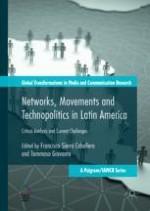2018 | Buch
Networks, Movements and Technopolitics in Latin America
Critical Analysis and Current Challenges
herausgegeben von: Francisco Sierra Caballero, Tommaso Gravante
Verlag: Springer International Publishing
Buchreihe : Global Transformations in Media and Communication Research
